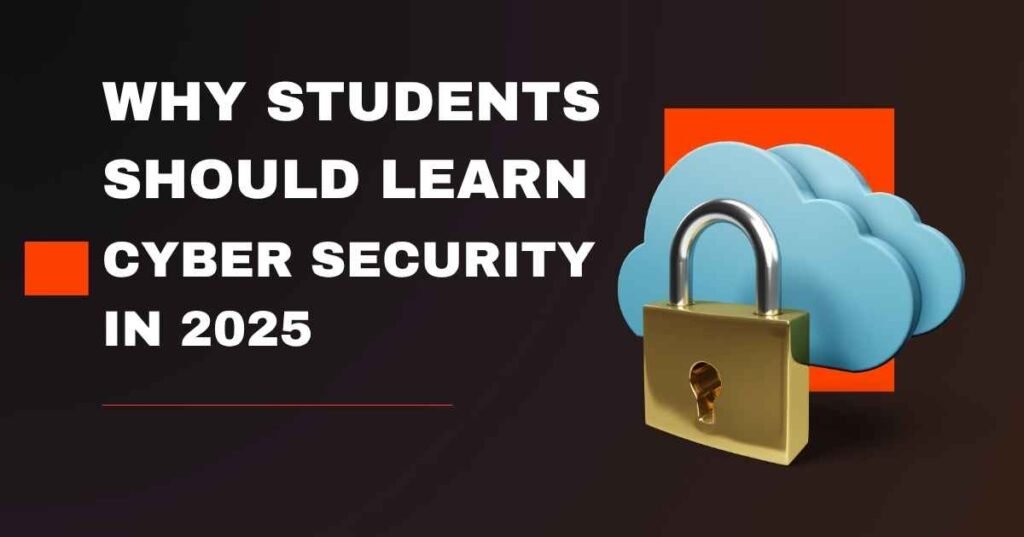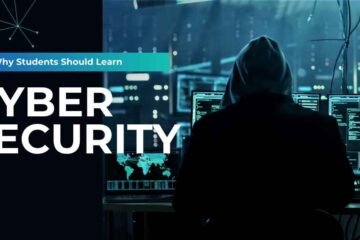In today’s digital-first world, technology touches every aspect of life from education and business to healthcare and government. With this growing dependency on digital infrastructure comes a rising wave of cyber threats. Data breaches, ransomware attacks, phishing scams, and identity theft are not just headlines anymore they are everyday realities.
This is why cybersecurity has become one of the most important career paths and skill sets of the modern age. As we move into 2025, students across disciplines whether in engineering, commerce, arts, or science must see cybersecurity not just as a niche IT subject, but as an essential life skill and a powerful career opportunity.
Why Cybersecurity Skills Matter in 2025

1. Rising Cybercrime Across the Globe
Cyberattacks are increasing in both frequency and complexity. According to industry reports, cybercrime costs are expected to cross $10 trillion annually by 2025. This means businesses, governments, and individuals will invest heavily in protecting their systems. Students who learn cybersecurity today will be in high demand tomorrow.
2. Every Career is Becoming Digital
Whether you’re in finance, healthcare, retail, or even education, digital tools are the backbone of modern operations. With this digitization, every professional must understand basic cybersecurity principles. For students, learning cybersecurity ensures they are future-ready across any career path.
3. A Growing Talent Gap
The world is facing a massive shortage of cybersecurity professionals. Industry bodies estimate a gap of over 3.5 million unfilled cybersecurity jobs globally. Students who equip themselves with cybersecurity skills in 2025 will find abundant job opportunities with attractive salaries.
4. Protecting Personal Data and Privacy
Beyond careers, cybersecurity is about personal safety too. Students handle sensitive data daily—emails, online banking, academic platforms, social media. Learning cybersecurity teaches them how to safeguard their own identities and digital footprints in an age where data is the new gold.
Key Benefits of Learning Cybersecurity for Students
1. High-Paying Career Opportunities
Cybersecurity professionals rank among the most well-paid in IT. From roles like Security Analyst and Ethical Hacker to Cybersecurity Consultant and Chief Information Security Officer (CISO), the career ladder offers excellent financial rewards.
2. Job Security in an Uncertain Economy
Unlike many industries disrupted by automation, cybersecurity is growing stronger. As long as there are hackers and evolving threats, skilled professionals will be needed. For students, this means a future-proof career path.
3. Versatile Career Options
Cybersecurity spans multiple domains:
- Network Security – Protecting communication systems.
- Application Security – Ensuring safe software and apps.
- Cloud Security – Protecting data in cloud platforms.
- Ethical Hacking – Simulating attacks to find vulnerabilities.
- Digital Forensics – Investigating cybercrimes.
Students can choose areas that match their interests, whether technical, investigative, or managerial.
4. Developing Critical Thinking & Problem-Solving
Cybersecurity is not just about coding—it’s about thinking like an attacker and defending like a strategist. Students learn analytical skills, quick decision-making, and problem-solving under pressure—abilities valued in every profession.
5. Opportunity to Contribute to Society
Cybersecurity goes beyond personal gain. By protecting systems, data, and privacy, professionals help build safer communities. Students who enter this field play a direct role in protecting individuals, businesses, and even national security.
Cybersecurity Trends Students Must Know in 2025
The landscape of cybersecurity is constantly evolving. By 2025, students will encounter:
- AI-Driven Threats and Defense: Hackers are using artificial intelligence to launch smarter attacks, while security teams use AI to detect threats faster.
- Cloud and Remote Work Security: With hybrid work models, protecting cloud data and remote access systems is critical.
- IoT Security: Billions of devices—smartphones, wearables, smart home gadgets—need strong safeguards.
- Zero Trust Architecture: Organizations are adopting a “trust nothing, verify everything” model of security.
- Cybersecurity Regulations and Laws: Governments worldwide are introducing stricter data protection laws, making compliance skills essential.
Students who understand these trends can align their learning with future-ready roles.
How Students Can Start Learning Cybersecurity
1. Academic Courses and Certifications
Universities are offering cybersecurity as a specialization. In addition, certifications like CompTIA Security+, CEH (Certified Ethical Hacker), CISSP, and CCSP are highly valued in the job market.
2. Hands-On Labs and Simulations
The best way to learn is by doing. Online labs and platforms allow students to simulate attacks, practice defenses, and gain real-world experience without risks.
3. Internships and Entry-Level Roles
Many companies hire students as interns for security operations. These opportunities provide practical exposure to tools, monitoring systems, and professional workflows.
4. Online Resources and Communities
Students can also start with free or affordable resources: MOOCs, YouTube tutorials, blogs, and open-source cybersecurity communities. Being part of forums helps them stay updated and network with experts.
5. Ethical Hacking and Bug Bounty Programs
Global tech giants run bug bounty programs where students can legally test applications for vulnerabilities and get rewarded. This is an excellent way to learn, earn, and build credibility.
Cybersecurity for Non-Technical Students
It’s important to note that cybersecurity isn’t limited to computer science students. Those studying law, business, finance, or social sciences can also benefit. For example:
- Law students can specialize in cyber law and data protection.
- Business students can focus on risk management and compliance.
- Finance students can learn fraud detection and secure transactions.
- Arts and communication students can contribute to awareness campaigns and training.
This shows that cybersecurity is a multidisciplinary field with room for diverse skill sets.
The Bigger Picture: Cybersecurity as a Life Skill
Even if students don’t pursue cybersecurity as a career, learning the basics is invaluable. Just like financial literacy or communication skills, digital security literacy is essential in 2025. From avoiding phishing scams to securing social accounts, these skills protect students in their personal and professional lives.
Also read: Why Everyone’s Suddenly Talking About It
Final Thoughts
As we step into 2025, the digital economy will only grow larger—and so will cyber threats. For students, learning cybersecurity is no longer an option but a necessity. It equips them with:
- Career-ready skills in a booming industry.
- Personal safety in a world of online fraud.
- Critical problem-solving abilities that add value across fields.
- Opportunities to contribute to global security and trust.
In essence, cybersecurity in 2025 is not just a career—it’s a calling. By embracing it early, students can shape a future where technology is not only powerful but also safe.

